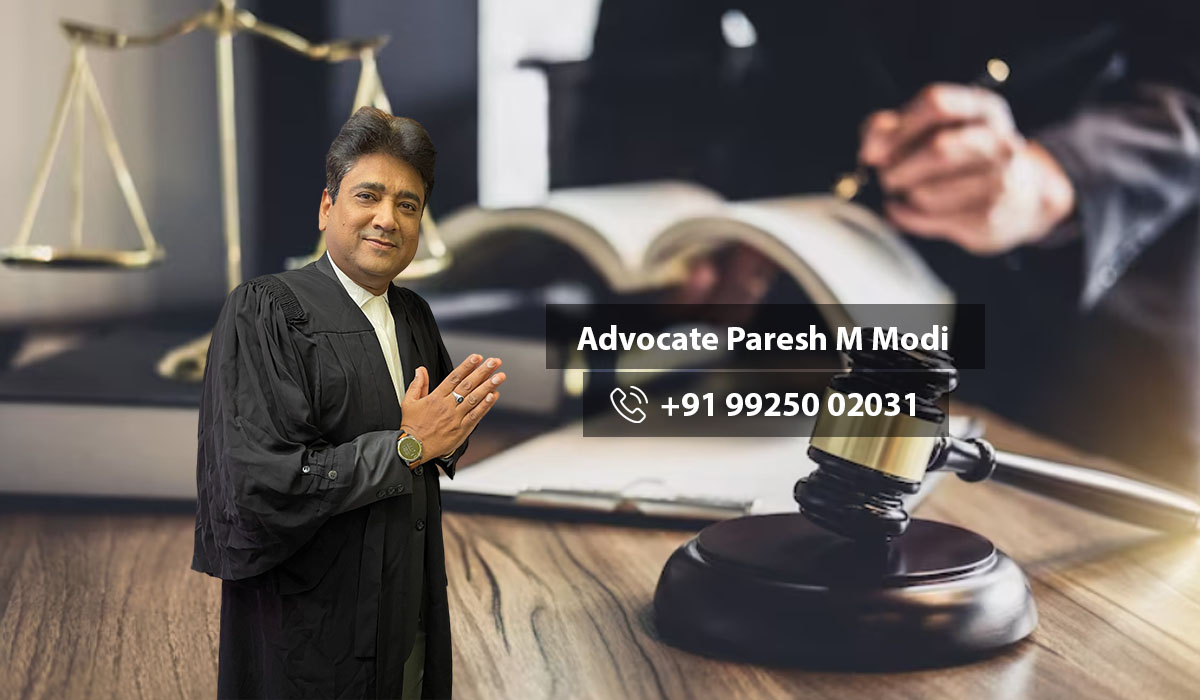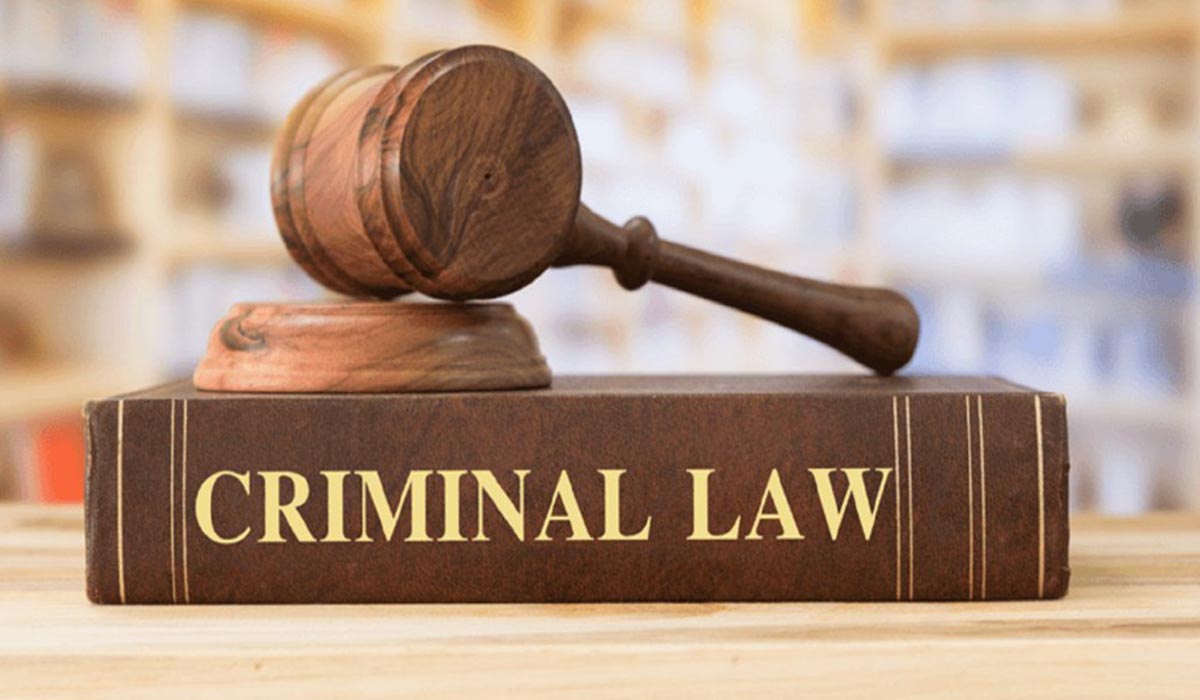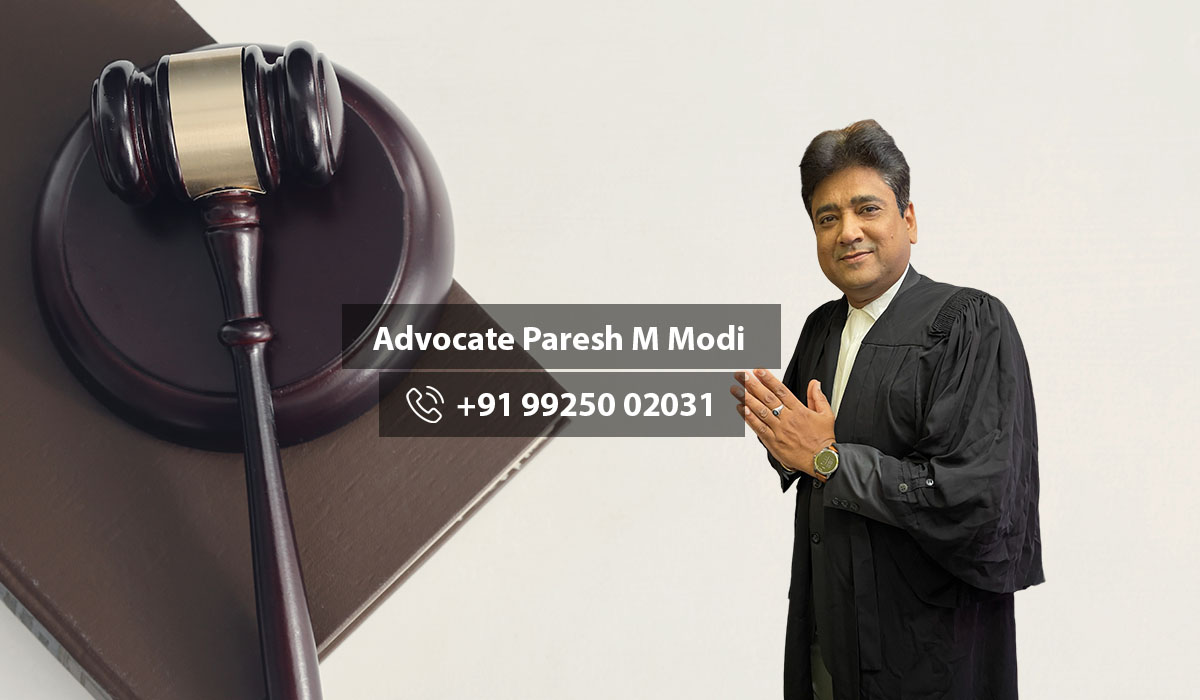Best Lawyer In Ahmedabad Gujarat | 9925002031 | Top Advocate in Ahmedabad Gujarat | Lawyers Near me in Ahmedabad Gujarat | Advocate Paresh M Modi
As a Top criminal lawyer in Ahmedabad Gujarat Advocate Paresh M Modi may guide you for your Criminal Cases and Civil Cases on the basis of the Indian Evidence Act, 1972
The Indian Evidence Act,1872
Lawyer for Loan EMI Issue in Ahmedabad Gujarat | 9925002031 | Advocate for Loan installment Problems in Ahmedabad Gujarat | Advocate Paresh M Modi
Section-80. Presumption as to documents produced as record of evidence.—
Whenever any document is produced before any Court, purporting to be a record or memorandum of the evidence, or of any part of the evidence, given by a witness in a judicial proceeding or before any officer authorized by law to take such evidence, or to be a statement or confession by any prisoner or accused person, taken in accordance with law, and purporting to be signed by any Judge or Magistrate, or by any such officer as aforesaid, the Court shall presume—
Cyber Crime Lawyer in Ahmedabad Gujarat India | 9925002031 | Best Criminal Vakil in Ahmedabad Gujarat | Best Civil Vakil in Ahmedabad Gujarat | Advocate Paresh M Modi
that the document is genuine; that any statements as to the circumstances under which it was taken, purporting to be made by the person signing it, are true, and that such evidence, statement or confession was duly taken.
Lawyers near me in Ahmedabad for Money Recovery | 9925002031 | Advocates Near me in Ahmedabad for Loan Recovery | Advocate Paresh M Modi
Advocate Paresh M Modi is the well-known Criminal and Civil Lawyer among the Top Criminal Lawyers and Civil Advocates in Gujarat, for your Family Matters, Ancestral Property case, cheque Bounce Case, Divorce Case, title Dispute Case, Property Disputes, Bail Matters, Maintenance Case, Domestic Violence Case, Atrocity Case, POCSO Case, PASA Act Case, Anti-Corruption Case, you may contact him, Call or WhatsApp now him on Mobile No. 9925002031 for book the Appointment.
Top Criminal Lawyers In Ahmedabad Gujarat | 9925002031 | Best Criminal Advocates in Ahmedabad | Advocate Paresh M Modi
Advocate Paresh M Modi is taking care of such Act Cases out of below mentioned 256 Acts (Bare Acts)
- Aadhaar (Targeted Delivery of Financial and Other Subsidies, Benefits and Services) Act, 2016
- Administrative Tribunals Act, 1985
- Advocates Act, 1961
- Air (Prevention and Control of Pollution) Act, 1981
- Air Force Act, 1950
- Aircraft Act, 1934
- Airports Authority of India Act, 1994
- Ancient Monuments and Archaeological Sites and Remains Act, 1958
- Anti-Hijacking Act, 2016
- Apprentices Act, 1961
- Arbitration and Conciliation Act, 1996
- Armed Forces (Special Powers) Act, 1958
- Armed Forces Tribunal Act, 2007
- Arms Act, 1959
- Army Act, 1950
- Banker’s Books Evidence Act, 1891
- Banking Regulation Act, 1949
- Banning of Unregulated Deposit Schemes Act, 2019
- Bharatiya Nyaya Sanhita, 2023
- Bharatiya Nagarik Suraksha Sanhita, 2023
- Bharatiya Sakshya Adhiniyam, 2023
- Bilateral Netting of Qualified Financial Contracts Act, 2020
- Biological Diversity Act, 2002
- Black Money (Undisclosed Foreign Income and Assets) and Imposition of Tax Act, 2015
- Bonded Labour System (Abolition) Act, 1976
- Border Security Force Act, 1968
- Bureau of Indian Standards Act, 2016
- Cantonments Act, 2006
- Carrier Laws Including Carriage by Road Act, 2007, Carriage by Air, 1972 and Carriage by Good by Sea 1925
- Central Motor Vehicles Rules, 1989
- Central Sales Tax Act, 1956
- Charitable and Religious Trusts Act, 1920
- Chemical Weapons Convention Act, 2000
- Child and Adolescent Labour (Prohibition and Regulation) Act, 1986
- Christian Marriage Act, 1872
- Citizenship Act, 1955
- Clinical Establishments (Registration and Regulation) Act, 2010
- Code of Civil Procedure, 1908
- Coinage Act, 2011
- Collection of Statistics Act, 2008
- Commercial Courts Act, 2015
- Commissions for Protection of Child Rights Act, 2005
- Commissions of Inquiry Act, 1952
- Commissions of Sati (Prevention) Act, 1987
- Companies Act, 2013 (Large)
- Compensatory Afforestation Fund Act, 2016
- Competition Act, 2002
- Conservation of Foreign Exchange and Prevention of Smuggling Activities Act, 1974
- Constitution of India
- Consumer Protection Act, 2019
- Contempt of Courts Act, 1971
- Contract Act, 1872
- Contract Labour (Regulation and Abolition) Act, 1970
- Copyright Act, 1957,
- Court Fees Act, 1870
- Credit Information Companies (Regulation) Act, 2005
- Customs Act, 1962
- Criminal Manual (Large)
- Criminal Procedure Code, 1973
- Delhi High Court Act, 1966 with Delhi High Court (Original Side) Rules, 2018
- Delimitation Act, 2002
- Dentists Act, 1948
- Depositories Act, 1996
- Designs Act, 2000
- Digital Personal Data Protection Act, 2023
- Disaster Management Act, 2005
- Dissolution of Muslim Marriages Act, 1939
- Divorce Act, 1869
- Dowry Prohibition Act, 1961
- Drugs and Cosmetics Act, 1940 with Cosmetics Rules, 1945
- Drugs and Magic Remedies (Objectionable Advertisements) Act, 1954
- Easements Act, 1882
- Electricity Act, 2003
- Emblems and Names (Prevention of Improper Use) Act, 1950
- Emigration Act, 1983
- Employees Compensation Act, 1923
- Employees Provident Funds and Misc. Provisions Act, 1952
- Employee’s State Insurance Act, 1948
- Enemy Property Act, 1968
- Energy Conservation Act, 2001
- Environment (Protection) Act, 1986
- Essential Commodities Act, 1955
- Explosives Act, 1884
- Evidence Act, 1872
- Factories Act, 1948
- Family Courts Act, 1984
- Fatal Accidents Act, 1855
- Food Safety and Standards Act, 2006
- Foreign Contribution (Regulation) Act, 2010
- Foreign Exchange Management Act, 1999 along with Rules and Regulations
- Foreign Marriage Act, 1969
- Foreigners Act, 1946
- Foreign Trade (Development and Regulation) Act, 1992
- Forest Act, 1927
- Fugitive Economic Offenders Act, 2018
- Gas Cylinders Rules, 2016
- General Clauses Act, 1897
- Geographical Indications of Goods (Registration and Protection) Act, 1999
- Government of National Capital Territory of Delhi Act, 1991
- Government Securities Act, 2006
- Gram Nyayalayas Act, 2008
- Guardians and Wards Act, 1890
- Hindu Adoptions and Maintenance Act, 1956
- Hindu Marriage Act, 1955
- Hindu Minority and Guardianship Act, 1956
- Hindu Succession Act, 1956
- Human Immunodeficiency Virus and Acquired Immune Deficiency Syndrome (Prevention and Control) Act, 2017
- Immoral Traffic (Prevention) Act, 1956
- Indecent Representation of Women (Prohibition) Act, 1986
- Indian Institutes of Management Act, 2017
- Indian Veterinary Council Act, 1984
- Industrial Disputes Act, 1947
- Industrial Employment (Standing Orders) Act, 1946
- Industrial Relations Code, 2020
- Industries (Development and Regulation) Act, 1951
- Infant Milk Substitutes, Feeding Bottles and Infant Foods (Regulation of Production, Supply and Distribution) Act, 1992
- Information Technology Act, 2000 along with Rules and Regulations
- Insecticides Act, 1968
- Insolvency and Bankruptcy Code, 2016
- Insurance Act, 1938
- Insurance Regulatory and Development Authority Act, 1999
- Insurance Rules 1939
- Interest Act, 1978
- Jammu and Kashmir Reorganisation Act, 2019
- Judges (Protection) Act, 1985
- Juvenile Justice (Care and Protection of Children) Act, 2015
- Juvenile Justice (Care and Protection of Children) Model Rules, 2016
- Legal Metrology Act, 2009
- Legislation of Muslim Law
- Legal Services Authorities Act, 1987
- Life Insurance Corporation Act, 1956
- Limitation Act, 1963
- Limited Liability Partnership Act, 2008
- Lokpal and Lokayuktas Act, 2013
- Maintenance and Welfare of Parents and Senior Citizens Act, 2007
- Maternity Benefit Act, 1961
- Medical Termination of Pregnancy Act, 1971
- Mediation Act, 2023
- Mental Healthcare Act, 2017
- Metro Railways (Operation and Maintenance) Act, 2002
- Mines Act, 1952
- Motor Vehicles Act, 1988
- Multi-State Co-operation Societies Act, 2002
- Narcotic Drugs and Psychotropic Substances Act, 1985
- National Anti-Doping Agency (NADA)
- National Bank for Agriculture and Rural Development Act, 1981
- National Commission for Minority Educational Institutions Act, 2004
- National Council for Teacher Education Act, 1993
- National Food Security Act, 2013
- National Forensic Sciences University Act, 2020
- National Green Tribunal Act, 2010
- National Highway Authority of India Act, 1988
- National Investigation Agency Act, 2008
- National Medical Commission Act, 2019
- National Security Act, 1980
- National Security Guard Act, 1986
- National Sports University Act, 2018
- National Waterways Act, 2016
- Negotiable Instruments Act, 1881
- New Legislation on Hindu Law
- Notaries Act, 1952
- Oaths Act, 1969
- Occupational Safety, Health and Working Conditions Code, 2020
- Official Languages Act, 1963
- Official Secrets Act, 1923
- Partition Act, 1893
- Partnership Act, 1932
- Passport Act, 1967
- Patents Act, 1970
- Payment and Settlement Systems Act, 2007
- Payment of Gratuity Act, 1972
- Penal Code, 1860
- Pension Fund Regulatory and Development Authority Act, 2013
- Petroleum Act, 1934
- Pharmacy Act, 1948
- Powers of Attorney Act, 1882
- Pre-conception and Pre-natal Diagnostic Techniques (Prohibition of Sex Selection) Act, 1994
- Press Council Act, 1978
- Prevention of Corruption Act, 1988
- Prevention of Cruelty to Animals Act, 1960
- Prevention of Damage to Public Property Act, 1984
- Prevention of Insults to National Honour Act, 1971
- Prevention of Money-Laundering Act, 2002
- Private Security Agencies (Regulation) Act, 2005
- Prize Chits and Money Circulation Schemes (Banning) Act, 1978
- Probation of Offenders Act, 1958
- Prohibition of Benami Property Transactions Act, 1988
- Prohibition of Child Marriage Act, 2006
- Protection of Children from Sexual Offences Act, 2012
- Protection of Civil Rights Act, 1955
- Protection of Human Rights Act, 1993
- Protection of Women from Domestic Violence Act, 2005
- Provident Funds Act, 1925
- Provincial Insolvency Act, 1920
- Public Gambling Act, 1867
- Public Liability Insurance Act, 1991
- Public Premises (Eviction of Unauthorised Occupants) Act, 1971
- Public Provident Fund Act, 1968
- Public Records Act, 1993
- Railway Claims Tribunal Act, 1987
- Railway Property (Unlawful Possession) Act, 1966
- Railways Act, 1989
- Rashtriya Raksha University Act, 2020
- Real Estate (Regulation and Development) Act, 2016
- Recovery of Debts and Bankruptcy Act, 1993
- Regional Rural Banks Act, 1976
- Registration Act, 1908
- Registration of Births and Deaths Act, 1969
- Religious Endowments Act, 1863
- Repatriation of Prisoners Act, 2003
- Representation of the People Act, 1950
- Requisitioning and Acquisition of Immovable Property Act, 1952
- Reservation in Central Educational Institutions
- Reserve Bank of India Act, 1934
- Right of Children to Free and Compulsory Education Act, 2009
- Right to Fair Compensation and Transparency in Land Acquisition, Rehabilitation and Resettlement Act, 2013
- Right to Information Act, 2005
- Rights of Persons with Disabilities Act, 2016
- Religious Institutions (Prevention of Misuse) Act, 1988
- Sale of Goods Act, 1930
- Sarais Act, 1867
- Scheduled Castes and the Scheduled Tribes (Prevention of Atrocities) Act, 1989
- Securities and Exchange Board of India Act, 1992
- Securities Contracts (Regulations) Act 1956
- Securitisation and Reconstruction of Financial Assets and Enforcement of Security Interest Act, 2002
- Seeds Act, 1966
- Sexual Harassment of Women at Workplace (Prevention, Prohibition and Redressal) Act, 2013
- Slum Areas (Improvement and Clearance) Act, 1956
- Small Industries Development Bank of India Act, 1989
- Social Security Code, 2020
- Special Marriage Act, 1954
- Specific Relief Act, 1963
- Stamp Act, 1899
- State Bank of India Act, 1955
- State Financial Corporations Act, 1951
- Street Vendors (Protection of Livelihood and Regulation of Street Vending) Act, 2014
- Succession Act, 1925
- Suits Valuation Act, 1887
- Supreme Court Rules, 2013
- Telecom Regulatory Authority of India Act, 1997
- Telegraph Act, 1885
- Terrorist Affected Areas (Special Courts) Act, 1984
- Trade Marks Act, 1999
- Trade Unions Act, 1926
- Transfer of Property Act, 1882
- Transgender Persons (Protection of Rights) Act, 2019
- Transplantation of Human Organs and Tissues Act, 1994
- Trusts Act, 1882
- Unlawful Activities (Prevention) Act, 1967
- Wages Code, 2019
- Waqf Act, 1995
- Water (Prevention and Control of Pollution) Act, 1974
- Weapons of Mass Destruction and their Delivery Systems (Prohibition of Unlawful Activities) Act, 2005
- Whistle Blowers Protection Act, 2014
- Wild Life (Protection) Act, 1972
- Working Journalists and Other Newspaper Employees (Conditions of Service) and Miscellaneous Provisions Act, 1955
અમદાવાદ ગુજરાતના ટોચના ફોજદારી વકીલ તરીકે એડવોકેટ પરેશ એમ મોદી ભારતીય પુરાવા અધિનિયમ, 1972ના આધારે તમારા ફોજદારી કેસો અને સિવિલ કેસો માટે તમને માર્ગદર્શન આપશે.
अहमदाबाद गुजरात में एक शीर्ष आपराधिक वकील के रूप में अधिवक्ता परेश एम मोदी भारतीय साक्ष्य अधिनियम, 1972 के आधार पर आपके आपराधिक मामलों और सिविल मामलों के लिए आपका मार्गदर्शन करेंगे।
भारतीय साक्ष्य अधिनियम,1872
धारा 80. साक्ष्य के अभिलेख के तौर पर पेश की गई दस्तावेजों के बारे में उपधारणा-
जब कभी किसी न्यायालय के मद्वा कोइ्र ऐसी दस्तावेज पेश की जाती है, जिसका किसी न्यायिक ािर्यवाही में या, विधि द्वारा ऐसा साक्ष्य लेने के लिए प्राधिकृत किसी ऑफिसर के समक्ष, किसी साक्षी द्वारा दिए गए साक्ष्य या साक्ष्य के किसी भाग का अभिलेख या ज्ञापन होना, अथवा किसी कैदी या अभियुक्त का विधि के अनुसार लिया गया कथन या संस्वीकृति होना तात्पर्यित हो और जिसका किसी न्यायाधीश या मजिस्ट्रेट द्वारा या उपर्युक्त जैसे किसी आॅफिसर द्वारा हस्ताक्षरित होना तात्पर्यित हो, तब न्यायालय उपधारित करेगा-
कि वह दस्तावेज असली है, कि उन परिस्थितियों के बारे में, जिसके अधीन वह लिया गया था, कोई भी कथन, किसका उसका हस्ताक्षरित करने वाले व्यक्ति द्वारा किया जाना तात्पर्यित है, सत्य है ताजा कि ऐसा साक्ष्य, कािन या संस्कृति सम्यक् रूप से ली गई थी।
In Ahmedabad, Best Lawyer of Gujarat High Court, Advocate Paresh M Modi is the well-known Criminal and Land Revenue Lawyer among the Top Criminal Lawyers in Gujarat, for your Property case, cheque Bounce Case, Divorce Case, title Dispute Case, Property Disputes, Bail Matters, Maintenance Case, Domestic Violence Case, you may contact him, Call or WhatsApp now him on Mobile No. 9925002031 for book the Appointment. He is the Advocate in Ahmedabad, Lawyer in Ahmedabad



